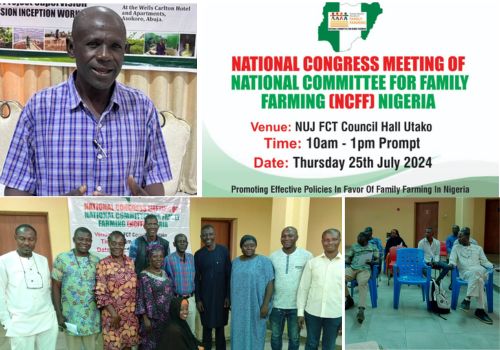By Queen Kunde
The National Committee for Family Farming (NCFF) Nigeria has urged investment in family farming in order to achieve food self-sufficiency and tackle the menace of hunger in Nigeria.
The National Coordinator, NCFF Nigeria, Mr Raymond Enoch made the appeal in Abuja on Thursday at the National Congress of the organization tagged, “Advancing Sustainable Agriculture, Food and Nutrition Security through Family Farming for a Renewed Hope Agenda for Nigeria.”
Enoch noted that the NCFF is building momentum towards advancing yet another milestone in promoting sustainable Agriculture, Food and Nutrition Security.
He defined family farming as a term which applies to organizing agricultural, forestry, fisheries, pastoral and aquaculture production that is managed and operated by a family who predominantly relies on family labor.
According to him, the family and the farm are linked and they co-evolve and combine economic, environmental, reproductive, social and cultural functions for the purpose of food production and consumption.
He therefore urged all relevant stakeholders and Nigerians to key into the initiative to tackle the menace of hunger, malnutrition that is bedeviling the citizens.
He said, “The purpose of the Meeting today is to bring the members of the National Committee for Family Farming (NCFF) in Nigeria together to broaden a national conversation on the seven pillars of the Global Action Plan of the United Nations Decade for Family Farming (UNDFF-2019-2028) as adopted by the United Nations General Assembly on the 20th December 2017 .The United Nations General Assembly adopted Resolution 72/239, which declared 2019 – 2028 as the United Nations Decade of Family Farming (UNDFF) with the following pillars. Pillar 1: develop an enabling policy environment to support family farming; Pillar 2: Youth and generational sustainability; Pillar 3: Gender equity and women’s leadership; Pillar 4: Strengthen family farmers´ organizations and their capacities; Pillar 5: Improve socio-economic inclusion, resilience and well-being of family farmers; Pillar 6: Promote sustainability of family farming for climate-resilient food systems; Pillar 7: Strengthen the multidimensionality of Family Farming.
“Let me quickly add that one of the main objectives foreseen in the UNDFF Global Action Plan (GAP) is the development of 100 National Action Plans on Family Farming by Governments in dialogue with Family Farmers’ organizations and with multi stakeholder platforms for policy dialogue, including the National Committees of Family Farming. The UNDFF -GAP also envisages a target of 5 Regional Action Plans and 7 Sub-Regional Action Plans on Family Farming developed in dialogue with family farmers’ organizations. Regional and sub-regional spaces can make a significant contribution promoting the implementation of the UNDFF agenda in their member countries.
“In UN Member countries which Nigeria is one, a National Action Plan (NAP) is a contextualized, country-specific framework of action for the support of family farming, providing a roadmap for progress in the implementation of the UNDFF towards sustainable food systems. The 7 pillars of the GAP, the NAP addresses the challenges and the potential of Family Farming from a comprehensive and multidimensional approach and envisages the articulation of the different sectors that intervene in the rural areas. Thus, the NAP contributes to national priorities not only in the agricultural sector, but also with regard to nutrition, environment, or heath, etc.
“The NAP is an opportunity for all relevant national stakeholders to mobilize resources, and to consolidate, align, and reinforce their actions in support of Family Farming towards sustainable, inclusive, viable and resilient food systems and the achievement of the Sustainable Development Goals (SDGs).”
The NCFF Nat’l Coordinator added, “We tagged our speech “Advancing sustainable Agriculture, food and nutrition security through family farming for a renewed hope agenda for Nigeria” because we believe that a coherent National Action Plan as anticipated by the UNGA Global Action Plan would bolster food security transformation and achieve the renewed hope agenda of the present government of President Bola Ahmed Tinubu in Agriculture in Nigeria.
“As we advance towards developing a context specific National Action Plan .In this direction therefore , the NCFF Nigeria has done the following
“Signed an MOU with the Federal Ministry of Agriculture and Food Security for the purpose of galvanizing strategic stakeholders to develop the NAP for Nigeria.
“To achieve the above NCFF Nigeria have equally approached several strategic partners of the Nigerian Government in the Agricultural sector notably the UN System (FAO and IFAD) The AFD and discussions are at the different levels in order to streamline actions that would give Nigeria, a NAP among other countries in the world that would be counted during the decade as having achieved the mandate of the United Nations General Assembly.
“We invite several actors and key players in the Agricultural sector and private sector, others farmer’s organizations, women and young people who have interest in achieving food self-sufficiency to join hands with the NCFF Nigeria to advance Sustainable Agricultural practices though Family Farming initiatives,” he said.


